Bobbie Ellen leaned against the wall of the arcade at Minnow Lake Campground and squinted at Nick Baker. The first wave of a thick Oklahoma summer had sent her inside with the rest of the gang, where the dark room and A/C kept them all from drowning in the heat. Not that being inside offered much relief, since Nick hogged every inch of cool with his seventeen-year-old self as he stood in front of the air conditioner and worked his usual game, Primal Rage. He dropped fifty cents into the coin slot and played another round, which meant another ten minutes of him slamming the joystick left then right and punching buttons so some giant gorilla might save the cavemen from apocalypse. The younger kids ooo-ed and ahh-ed at his technique, but Bobbie just let out a heavy sigh and crossed her arms.
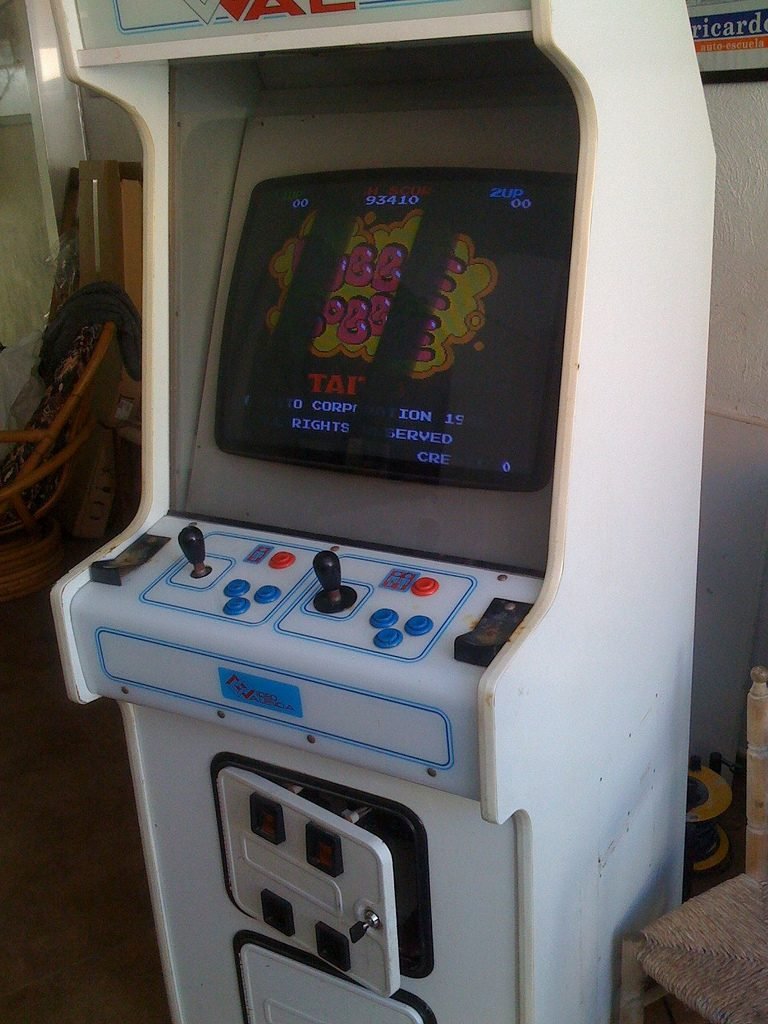
Nick and his family had been coming to the Minnow Lake for the last three years, always around the same time of the summer that Bobbie and her parents camped. She and Nick were in the same grade and usually the oldest kids around, so she tried hanging out with him at first. Even thought he was cute. But he was weird about going down by the lake and only wanted to play air hockey all day. When she teased him, he got mean, hassled her in front of the other kids and—once—popped her bra strap when he stood behind her at the soda machine. She’d elbowed him harder than she meant to but wouldn’t apologize. Every summer he showed up taller, lankier, and acting like more of a punk. After the campground brought Primal Rage into the arcade, he claimed it as his own by rigging the coin slot so no one else could play unless he was around.
Slumped in front of the machine now, Nick was starting to look like that gorilla in the game, only with less hair. And maybe less muscle. But he was still thick enough to block all the good air, then bitch about the heat and not having anywhere decent to swim at the campground. His tagalong, Mark, mentioned the peninsula, and Nick dropped his shoulder back, gave Mark a shove, and said he’d been there. “I know about a private road that leads to the beach,” Nick told him. “It’s just another patch of sand.”
Bobbie pulled herself away from the wall, her shirt sticking to her back. “Why not take us all down that private road and let us decide? Seeing as you’re not planning on sharing any of that A/C.”
He flipped her off over his shoulder. “The water’s shitty, same as here. That’s why.” But they all knew the water was cleaner across the bay.
“Bet you’ve never even been there,” Bobbie said.
“That’s a bet you’d lose.” As the game played out the scene between levels, he reached into his pocket and gave his little brother Greg a dollar. “Get me a soda. And I want my change.”
Bobbie rolled her eyes and followed Greg out the door, holding it open wide enough to let in a wall of hot air, which set Nick and his buddies groaning.
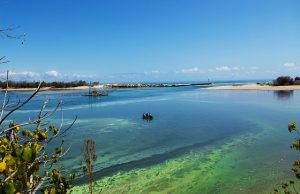
Later, Bobbie went down to Minnow Lake alone. She remembered swimming off the end of the dock during the summer she turned ten. The lake had been pretty back then. She had jumped out as far as she could into the clear water and floated back to the shallows, her face to the sun and the muffled sound of waves against rocks brushing by her ears. Now the dock was gone, and construction on the other side of the lake had changed the flow of water. Slime rode the waves and collected into blankets, smothering part of the rocky shoreline. The air smelled rotten. You could swim around the muck, but you always ended up in the thick of it no matter what; it clung to you like a parasite.
She stood at the edge, adjusted her bra, and wiped the sweat from underneath the band. Threading the bottom of her shirt through her collar, she pulled it into a makeshift halter-top and walked along the rocks. She was careful to step around the tiny puddles that filled the dips and crevices in some of the stones but misjudged the surface of one flat rock too close to the water. She slipped, fell, and a twinge of pain ran across her thigh. She dabbed her finger at the cut, gauging its severity, then pressed the fabric of her shorts against it and kept walking. She wanted to reach the peninsula.
She’d heard that somebody with money had dredged the shoreline and combed the beach so that the sand was smooth and light. She’d heard rumors of a better breeze, fresher air. She pulled her ponytail higher off her neck. She wondered if her dad might be right when he went on a tirade about a private resort maybe or somebody famous building a mansion and a fence to “block the masses.”
Her dad didn’t like being edged out of anything. He’d been working the same job since before she was born, punching holes into metal plates for auto assembly, attending union meetings, bowling every Wednesday. But he always talked about getting off the floor and into one of those air-conditioned offices. When he’d gone to work in a suit one day, he seemed hopeful. Tickled her mother from behind. Pulled on Bobbie’s ponytail and said they’d all be going out for steak that night to celebrate. But he’d come back late in the evening smelling of beer. Had tossed his blazer in the garbage. Ranted that he’d bank his pension and suck them out of every minute of vacation.
Part of that vacation was spent camping at Minnow Lake; it used to be the highlight of Bobbie’s summer. Her mother would make list after list of menu ideas and groceries, only to toss the papers and declare, “Water, wine, and whatever your father catches for the day.” Her father would then pound his chest and strut out to the garage for his poles and tackle.
Bobbie’s favorite part of getting ready was the airing of the camper: the crack of the door when it first opened, the way the sun pierced the dark inside, her mother’s three-part ceremony of lowering the steps, pausing at the threshold, then giving Bobbie her hand. “The magic doesn’t happen without you, little miss.” In truth, it was her mother who made everything perfect. After wiping down the counters with lemon-scented spray, she tied small bunches of lavender from her herb garden and hung them in front of every window. Then, when the three of them finally climbed inside the camper and set off on the road, Bobbie planted herself on the foam couch across from the kitchen sink and alternated between watching the trees roll past on her left to admiring the purple blooms swinging like a pendulum on her right, marking place and time.
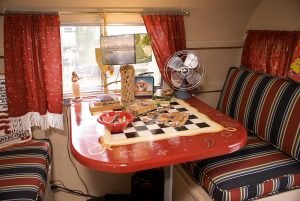
Bobbie always woke to the sound of cabinets popping open and closed, and then the silhouette of her father standing over her, fishing pole in hand. He would pull the sheet up to her neck and tuck her in. And looking past the curtain behind which her mother still slept, he’d wink. “Beauty rest,” he’d whisper, then he’d kiss Bobbie on the forehead. “Pop Tarts in the top cabinet. Our little secret.” Before he’d walk out the door, she’d hear him pat the front pocket of his vest where he kept a notebook filled with a rough-drawn map of Minnow Lake and tallies of when and where and how many fish.
But this summer, Bobbie’s mother had forgotten the lavender. Her father had packed up his fishing rods with less of a show. Even the camper had fallen victim to the shift in mood: its door wouldn’t latch and the table now had a permanent lean. Bobbie broke it by accident days after they arrived, when she reached across it for the catsup at dinner. The sound of the snap underneath pulled her parents out of an argument about her mother going back to school, and her father turned his anger on Bobbie, yelling that she shouldn’t be so careless. Her mother slammed her fork on the table; her father cut into his steak. Finally, her mother turned to Bobbie and asked about the usual kids, wondered aloud about the Bakers and their son Nick. Bobbie shrugged. Her mother mentioned Mrs. Baker and said, more to herself, that she might stop by their camper. She held Bobbie’s hand for a second until her father looked up. “Life isn’t so bad,” she said. “I don’t want to argue.” When the three of them fell into silence again, he pushed himself out from behind the table and stomped outside. The door slammed and bounced in its frame three times before the latch finally clicked.
The cut on Bobbie’s leg had stopped bleeding, so she followed along the water line again, stepping onto soggy ground until she saw the opening to an old trail. The path ran up along the ridge, and in the distance she saw the color of the water change from dingy brown to deep blue. At an impasse of twisted brush, she turned sideways and squeezed through. The branches pulled at her top, snapped loose and rustled a snake out of hiding. Bobbie took off running.
This summer, her father still fished on the lake, but he never woke her when he left. He snuck out earlier and came home later, sometimes empty-handed. But last night when he did return with a string full of fish, he said he was “off the hook” for dinner. He laughed; her mother sighed. So he sat down, gutted the fish, and mumbled as one by one he handed them to her mother. Slumped at the sink, her mother let the water run out their insides.
“Set the table, Bobbie, would you?” Then, she turned off the faucet. “I’m worn out,” she said to Bobbie’s father. “Why don’t you at least fish for bass? These perch don’t make much of a meal.”
Her father rolled up the rest of the fish in newspaper and threw them in the trash. Then he downed his beer, went to the back of the camper, and closed the curtain.
Bobbie hadn’t expected to run into a ravine. She studied the slope of it and the sandy bottom. Safe enough, she figured. She slid down and used a tree root to pull herself up the other side. Stopping to catch her breath, she heard something crash behind her and someone holler out. Nick was in the ravine.
Suddenly feeling shy, she tugged at her shirt so that it covered her. “What are you doing here?” she asked.
He brushed off his shorts and tried to climb up. “Help me.”
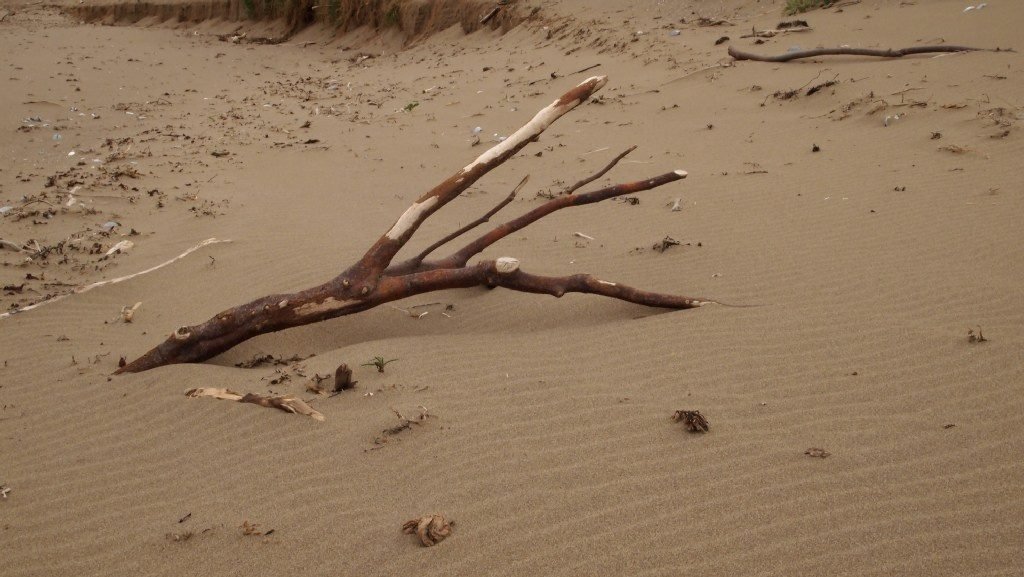
She didn’t budge. “Why didn’t you take the private road?”
“Shut up,” he said. “Just help me.”
Rolling her eyes, she wrapped her fingers around a skinny birch tree, gave him her hand, and hoisted him to the top. He was lighter than she expected. And embarrassed. He wouldn’t even look her in the face as he pushed past her, until she grabbed his arm.
“Wait, you have to make sure no one is around.”
They snuck along the tree line until they saw a cut in the lot where a house might go. But the only hint of life was a busted 12-pack box of Busch and several crushed cans.
“Looks deserted to me,” he said, heading straight for the beer. He kicked the pile of empties and picked up the box. Reaching inside, he pulled out a can. “This one’s full!” He’d had that same idiot grin on his face as when he brought his dad’s half-empty pack of Newports to the arcade one day. He never even smoked one, but he set them next to the joystick and silently dared anyone to touch them.
Bobbie ignored him now like she did then and walked towards the water. She took off her shoes and rolled up her shorts two folds until they fit snug below her bottom. This wasn’t just some “patch of sand.” It was soft under the heel of her foot and ran loose between her toes. Warm. Clean. The water glistened. The air smelled like lake and pine, not rotting fish.
As she reached the water line, she turned around. Nick stood frozen with the empty box of Busch in one hand and the full beer in the other, his eyes wide, so she glanced along the shore her to see if she had missed something. But there was only beach and water. “Come on,” she said to him, and she went in ankle-deep.
He stayed silent behind her.
Up to her thighs in the water, she ran her fingers through the waves. Her mother would love this. She’d talked all summer about swimming and had tried to convince her father to go to a different campground, one with a pool. He’d refused. Back over her shoulder, Nick hadn’t moved.
“What’s wrong with you?” she said. “Aren’t you gonna get in the water?”
“Shut up.”
“That’s the second time you’ve told me to shut up, Baker. What‘s up with you?”
“Nothing.” He ran his arm across his forehead. “It’s none of your damn business.”
She shook her head and dove in. When she came to the surface and opened her eyes, Nick was sitting on the beach drinking the beer. She thought he had moved further back.
“You shouldn’t go so far out,” he yelled.
She swam back in, and after she wrung the water out of her top, she sat down next to him and pulled her knees up to her chest. “I know how to swim,” she said. Then it struck her, and she asked in a kinder way, “Do you?”
“I said it’s none of your business.”
“Whatever.”
They watched the water, listened to wind rustle the tiny leaves of the birch. She buried her feet in the sand, wiggled her toes free. He finally let go of the busted beer box, so she reached for the can of beer. He stopped her.
“It tastes like shit.”
Then he poured out the beer in the shape of a spiral.
Bobbie stood up. “Come on.”
“I’m not going in the water.
“I didn’t say anything about the water. Jesus. I saw some raspberry bushes back there.”
They ate berries; he carved his name in a pine tree with a knife from his pocket. They found an old log and rolled it into a clearing. With rocks gathered from the woods, she made a circle, and Nick dug out a small fire pit.
Finally, she asked him, “You fish, right? I’ve seen you down by the old dock.”
“Used to fish.”
“Okay. Why don’t you swim?”
“I used to,” he said, tightening up the circle of stones around the pit.
She laughed. “Used to fish, used to swim. That doesn’t really answer my question.”
He threw one misfit rock back into the woods. Then nothing.
“If I wanted to sit and watch someone not talk,” she told him, “I’d head back for dinner with my parents.”
He grunted. When he finally spoke, he asked, “Why do you have two names, Bobbie Ellen? Your parents couldn’t decide if you were a boy or a girl?”
“Ha ha. It’s Bobbie with an ‘ie.’ And I’m named after my grandmother, who was kick ass.” She stood up.
“I’m just kidding,” he said. She walked off anyway, so he followed. She filled the crook of her arm with fallen branches and twigs, and he scooped up handfuls of pine needles.
“I know how to swim,” he said. “I just don’t anymore.”
They carried what they’d gathered back to the fire pit. Together, they stacked it all into a tiny mountain.
“My baby sister drowned,” he said, just like that. Pushed sand away from the middle of the pit and shoved needles far up under the twigs. She thought maybe she hadn’t heard him right.
“You had a sister?”
“Before we started coming here. It happened a few years ago at a different campground.” He rearranged the kindling. “It was in the news,” he said, quiet. “She was barely six months old.”
The Bakers. Her mother must have known. Bobbie walked around to the other side of the pile of twigs and squatted beside him, let her shoulder touch his. She picked up a pine cone and set it on top. “I’m sorry,” she said.
“I took her out there.” He stood but wouldn’t look at her. “It was an accident. She got away from me.”
Bobbie had a fuzzy memory of leaning over the edge of a dock when she was four or five, peering into the water at the fish, her father beside her tying a lure on his line. Tough to catch one of those little fellas he’d said. But she was determined. She slipped both hands into the water and waited until a fish came close. As she jumped to snatch it, she lost her balance, twisted her body to grab the dock, and hit her head. When she came to, her father was in the water with her, his clothes soaked. Almost got away from me, he’d said. Slippery little sucker, he told her as he held her close.
“Slippery little sucker,” she said to Nick.
“What?”
“I mean babies. They’re slippery.” She had meant to be helpful.
“Yeah.” He put his hands in his pockets. “My mother won’t even look at me. Not really. I don’t know why we keep camping. She sleeps the whole time.” He could be a prick sometimes, but she saw he was worn out like the rest of them.
“You haven’t been in the water since?”
He shook his head.
“Hey,” he said. “You got a match? We should burn this shit.” He threw one more handful of needles into the fire pit.
“We’ll come back,” she said.
“Just you and me?”
“But you have to get in the water.”
“No way.”
“It’s real shallow for a while.”
“Forget it.”
“I’ll go with you.”
“I don’t need a babysitter,” he said. But after another minute: “The water’s nice?”
“Think icy-blue snow cone on a hundred degree day.”
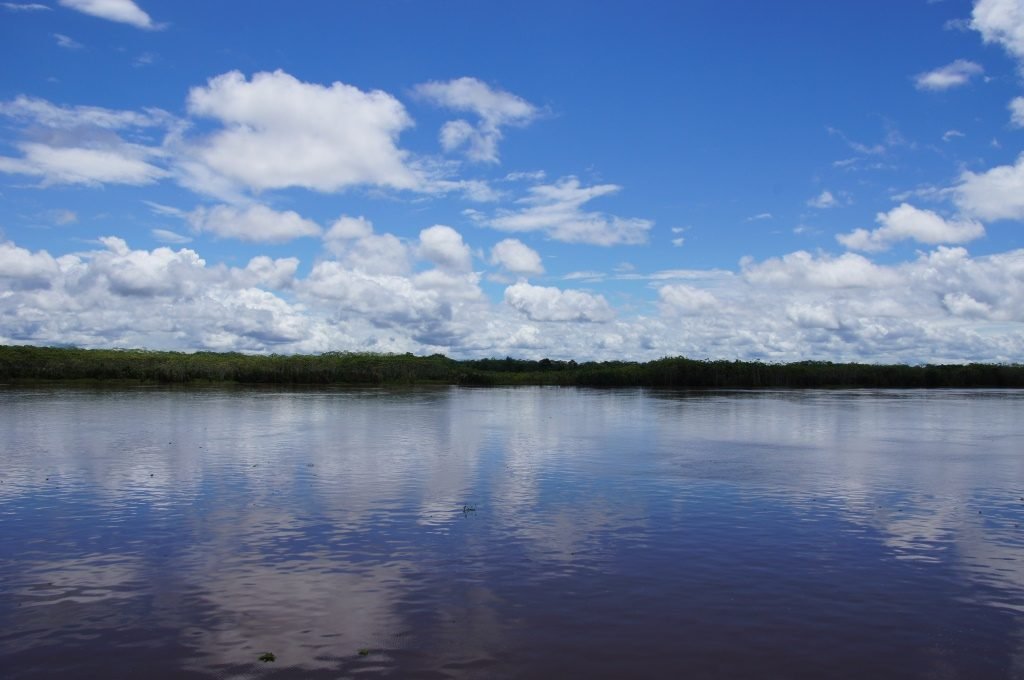
He nodded. “Sweet.”
“Exactly.” She offered her hand for the second time. He took it, but she practically pulled him along the beach. They went in far enough so that when they sat in the water it was belly deep. He cringed and let out a stunted laugh.
“We should float,” she said.
“I’m not going in deeper.”
“No. We’ll float here. Let your hands rest on the bottom if you want.”
He leaned back and raised his eyebrows, but she didn’t wait for him; she lowered her body back until the water covered her ears and quieted the world. Closing her eyes to the sun, she lifted her feet and moved her arms slowly back and forth to keep herself in place. When she felt Nick bump into her, she figured he was floating, too, and she smiled. Then, a shadow crossed her face and brought with it the smell of raspberries. He kissed her.
She put her hands on the bottom of the lake to steady herself. His lips tasted sweet; his hand grazed the back of her neck; there was relief in his touch. When the sun lit her face again and they both caught their breath, she sat up slowly. Studied him from behind. “The water isn’t so bad,” she said. She held his hand, while they drifted together in the current, the campground miles away.

Share this post with your friends.

